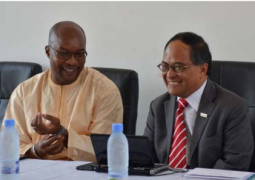The Director of Inter-Sectoral Network has said the objectives of Global Climate Change Alliance (GCCA) project are to contribute to the capacity of the government and people of The Gambia to adapt to increased climate variability and change.
Momodou Jaama Suwareh made these remarks at the opening of a three-day refresher training workshop on Integrated Coastal Zone Management (ICZM) and Climate Change Adaptation as part of the EU-GCCA support project to The Gambia.
He noted that the project would strengthen national level capacity to plan for and respond to climate change impacts in coastal areas and to provide support and guidance to mainstreaming of climate change into development planning.
He warned that The Gambia is highly vulnerable to rise in sea level because of its low-lying coastal areas, in addition to the fact that there is no over-arching and integrated coastal zone policy or consultation mechanism allowing for the harmonization of actions from different institutions in the coastal zone.
According to him, in view of the concentration of the socio-economic activities and cultural assets in low-lying coastal areas, The Gambia is particularly vulnerable to climate change impacts, which include sea-level rise, increased saline intrusion and flooding during torrential rains.
This project therefore, Suwareh noted, is anticipated to address coastal adaptation to climate change, which will define and establish a participatory Integrated Coastal Zone Management (ICZM) process for The Gambia focusing on coastal adaptation, and also mainstreaming of climate change into development agendas which will define climate change policy that integrates measures into sectoral planning programming and budgeting.
Director Suwareh therefore noted that the training was organsied with the aim of building the capacity of key stakeholders within the coastal zone on the concept of Integrated Coastal Zone Management and Climate Change Adaptation.
Furthermore, he said, the knowledge and skills acquired from the training would not only help the participants to understand the concept of the subject areas of the training but would also contribute effectively to the ICZM process and mainstreaming of climate change issues in the country/’s development plans.
He said the implementation of the project signifies the commitment to nation-building, protecting people and their livelihoods from the impacts of climate change.



